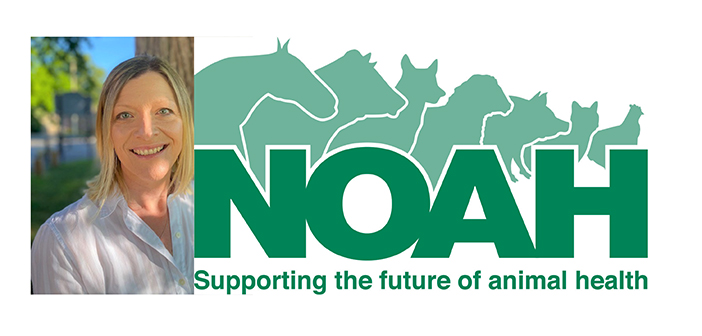NOAH’s 2021 AGM took place this week, where Caitrina Oakes, managing director of Vetoquinol UK and Ireland, was elected as its chair for 2021/22.
Ms Oakes has outlined some of the areas she is prioritising over the next 12 months. One of the most important areas, she said, will be the consultation and review of the UK Veterinary Medicines Regulation, due later this year.
Ms Oakes said: “We need a regulatory climate to ensure animal medicines availability, as well as to encourage innovation. We are in the final stages of developing detailed proposals that will set out how we believe this might be achieved and look forward to providing any help we can to ensure our new Regulation enables our members, and the benefits their products and innovation brings, to thrive– and continue to protect the health and welfare of our nation’s animals.”
With animal disease knowing no borders, Ms Oakes explained that NOAH will be even more outward facing, working on a global stage.
She added: “Our wider horizons since the UK’s exit from the European Union have meant that we have been working in an even closer partnership with the world animal health association HealthforAnimals, which strengthens our influence at a global level.
“Recently, this has included regular participation, alongside the VMD, in the planning meetings led by the Department of Health and Social Care in preparation for the G7 Health Ministers meetings in advance of last weekend’s G7 Summit in Cornwall. It has been good to see the One Health approach taken in respect of antimicrobial resistance in their Communique, and we look forward to continuing this collaborative approach.”
Ms Oakes explained that NOAH would also be focussing on sustainability: there is no time to lose in the push for sustainable development.
She said: “We know our sector helps make a difference. Improving animal health accelerates the journey towards more sustainable future food systems. Poor health and welfare in animals limit their potential, representing a missed opportunity to produce food as sustainably as possible whilst building a more resilient livelihood for farmers.
“Healthy animals receiving proper nutrition are better able to digest feed and produce lower levels of emissions, while protecting animals against infection – such as through vaccination – reduces the risk of disease, and the need for antibiotics.
“But like everyone, we can do more. The board will be taking forward sustainability improvements, including a sustainability policy for our association. We are looking to see how NOAH can help lead us collectively and collaboratively to aim even higher.”
The representation within NOAH is also important, particularly to ensure that the association continues to adapt to serve its growing and more diverse membership as it moves forward from the pandemic.
Ms Oakes added: “As well as representing around 97% of the animal medicines industry, our current members alsoalready have a diverse product spread, including feed additives and nutraceuticals and an increasing interest in diagnostics and digital technologies.
“This is something we can celebrate, and work towards an even broader representation. As the future changes fast, catalysed by the pandemic, NOAH will change with the times to serve our modern and changing sector.”


